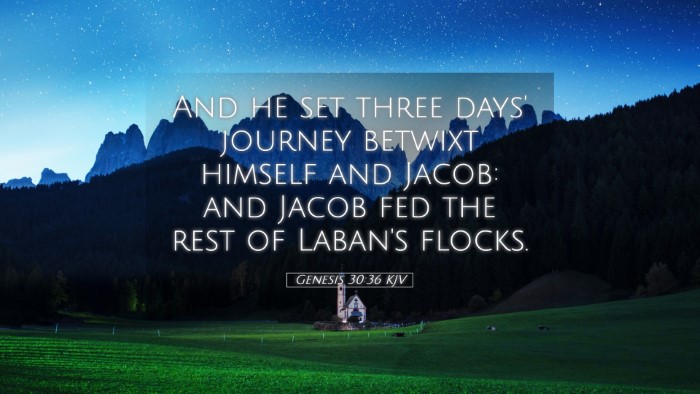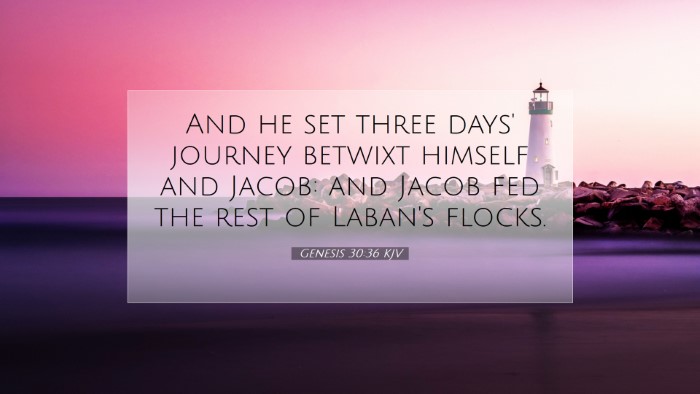Commentary on Genesis 30:36
Genesis 30:36 states: “And he set three days' journey between himself and Jacob: and Jacob fed the rest of Laban's flocks.” This seemingly simple verse is rich with implications about relationships, trust, and the providence of God. Below, we will explore various insights provided by esteemed commentators on this passage.
Contextual Analysis
This verse occurs in a context of increasing tension between Jacob and Laban. Laban, having profited significantly from Jacob's labor, now attempts to assert control over the terms of their agreement. Understanding the preceding events is crucial for interpreting Jacob's situation and the choices he makes, which highlight themes of divine favor and human strife.
Matthew Henry's Insight
According to Matthew Henry, this passage underscores Laban’s desire to separate himself from Jacob, reflecting both a strategic move to distance himself from Jacob’s prosperity as well as a desire to avoid the influence of Jacob’s growing wealth. Henry points out that Laban sets a “three days’ journey” presumably to remove Jacob from his immediate supervision, fearing that Jacob's increasing strength could threaten Laban's own interests.
Key Points from Henry:
- Separation signifies conflict: Laban's separation strategies reveal his mistrust and attempts to curtail Jacob's ascendancy.
- Divine providence: Jacob’s success comes not merely from his labor but from God’s blessing, which is unavoidably evident regardless of Laban's machinations.
- God’s purpose in difficulty: The distancing reflects a critical point in Jacob's journey not just in terms of physical space, but spiritual growth, as he is learning to trust God's guidance.
Albert Barnes' Commentary
Albert Barnes further elaborates on the implications of Laban's decision, interpreting the act of setting a distance as a reflection of Laban's fear and jealousy of Jacob's increasing wealth. Barnes notes that Jacob’s feeding of Laban’s flocks was a testament to his loyalty, even in the face of Laban’s mistrust.
Key Insights from Barnes:
- The separation is strategic: Laban's fear of losing his economic grip led him to create physical space, showcasing an underlying tension.
- Jacob’s action reveals character: Jacob demonstrates fidelity in his responsibilities despite the challenging dynamics of his relationship with Laban.
- God's providential care: As Jacob tends to the flocks, this act reflects not just loyalty but also God's provision, as Jacob uses this opportunity to increase his own fortunes through divine strategies.
Adam Clarke's Perspective
Adam Clarke approaches the text with an additional emphasis on the implications of the chosen distance imposed by Laban. He interprets this maneuver as a sign of Laban’s inability to fully control the outcomes of his decisions, which ultimately points to God's sovereign power over the affairs of men.
Clarke's Insights Include:
- Human actions versus divine sovereignty: Laban's attempts to manipulate the situation underscore the limitations of human foresight in the face of God’s overarching plans.
- Jacob’s role as a steward: As he continues to tend the flocks, Jacob exhibits qualities of diligence and stewardship, reminding readers of the importance of faithfulness in less than ideal circumstances.
- Foreboding of future developments: The separation serves as a foreshadowing of temporary hardships that Jacob will face ahead but also highlights the ultimate deliverance he can expect from God.
Thematic Insights
The overarching themes extracted from this verse and the accompanying commentaries include:
- Trust in God’s Plan: Jacob’s experiences are indicative of how providence operates, guiding his actions even amid conflict.
- Mistrust in Relationships: Laban’s actions reveal the impact of jealousy and mistrust, which can destroy relationships if not addressed.
- Integrity Amid Adversity: Jacob maintains his integrity and focuses on his responsibilities despite Laban's ploys.
Conclusion
Genesis 30:36, while concise, encapsulates a vivid interaction between two key figures marked by mistrust, ambition, and the underlying sovereignty of God. The insights garnered from Matthew Henry, Albert Barnes, and Adam Clarke illuminate the complexities of this relationship and encourage a reflection on the themes of loyalty, providence, and the consequences of human choices against the backdrop of divine oversight.


